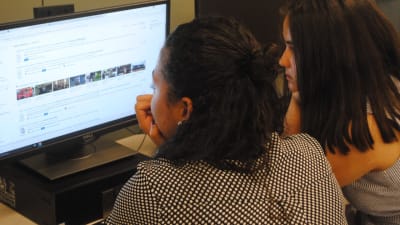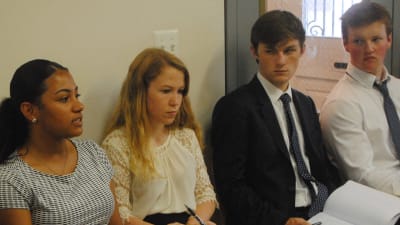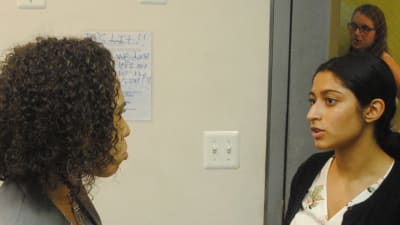Summer 2017 presents capstone policy document at the State Department
Suppose you were called to testify before Congress…or argue a case in front of the Supreme Court…or defend your PhD thesis…how would you prepare? Over the last three weeks our students underwent a boot camp for those (and other similar) leadership challenges. And their preparation ended with a real-life State Department presentation.The collaborative policy document (or “CPD,” as our students call it) is one of SEGL’s most difficult challenges. Each SEGL cohort must select a current international crisis, research that crisis and collaboratively craft a 40-page scholarly document which is then presented and defended in front of real-world policymakers.
This spring chose the South China Sea as its topic. Few topics are as thorny or as unknown to American audiences. After making this decision, the students split into six sub-groups, each with a different area of expertise. The groups researched the current situation and drafted dozens of policy recommendations.
They then spent a day in the George Washington University main library, with full access to the University’s resources. David Ettinger (the top international relations/political science research librarian at GW), who has been a student favorite since our first semester, started with an entertaining orientation session so that the students know how to use the myriad databases in the GW system (this is also good preparation for undergraduate life!), and then the students were off to the many corners of the building.
The research process also involves contacting experts for phone and in-person interviews. This requires ingenuity and a bit of courage and often leads to excitement and insight. For example, the group focusing on ethical questions called Devin Stewart at the Carnegie Council for Ethics in International Affairs, who added his insight and connected students with other experts.
After compiling their research for several days, the students created rough drafts that our faculty critiqued (often as stridently as a Supreme Court Justice, Member of Congress, or dissertation committee member might!). Students discuss, disagree, research, and revise, and then it is time for the final presentation. Each semester we try to meet with on-the-ground policymakers who have the ability to incorporate our students’ ideas into actual policy.
This summer we visited several experts at the State Department’s East Asia and the Pacific Bureau. Together, they have decades of experience on how to keep the region from all-out conflict. (We also had a Summer 2015 graduate and current State Department summer intern sit in!)
The students afterwards were both proud and relieved. They had done the research and had the preparation to engage in a real conversation about a sophisticated current issue with leading experts. What an accomplishment!
Want to read the document for yourself? You can download it here.
Below we have also included photos from our visit with Akosua Ali, President of the DC branch of the NAACP. She visited us as part of a mini-case study on the relationship between the African American community and the police.




















